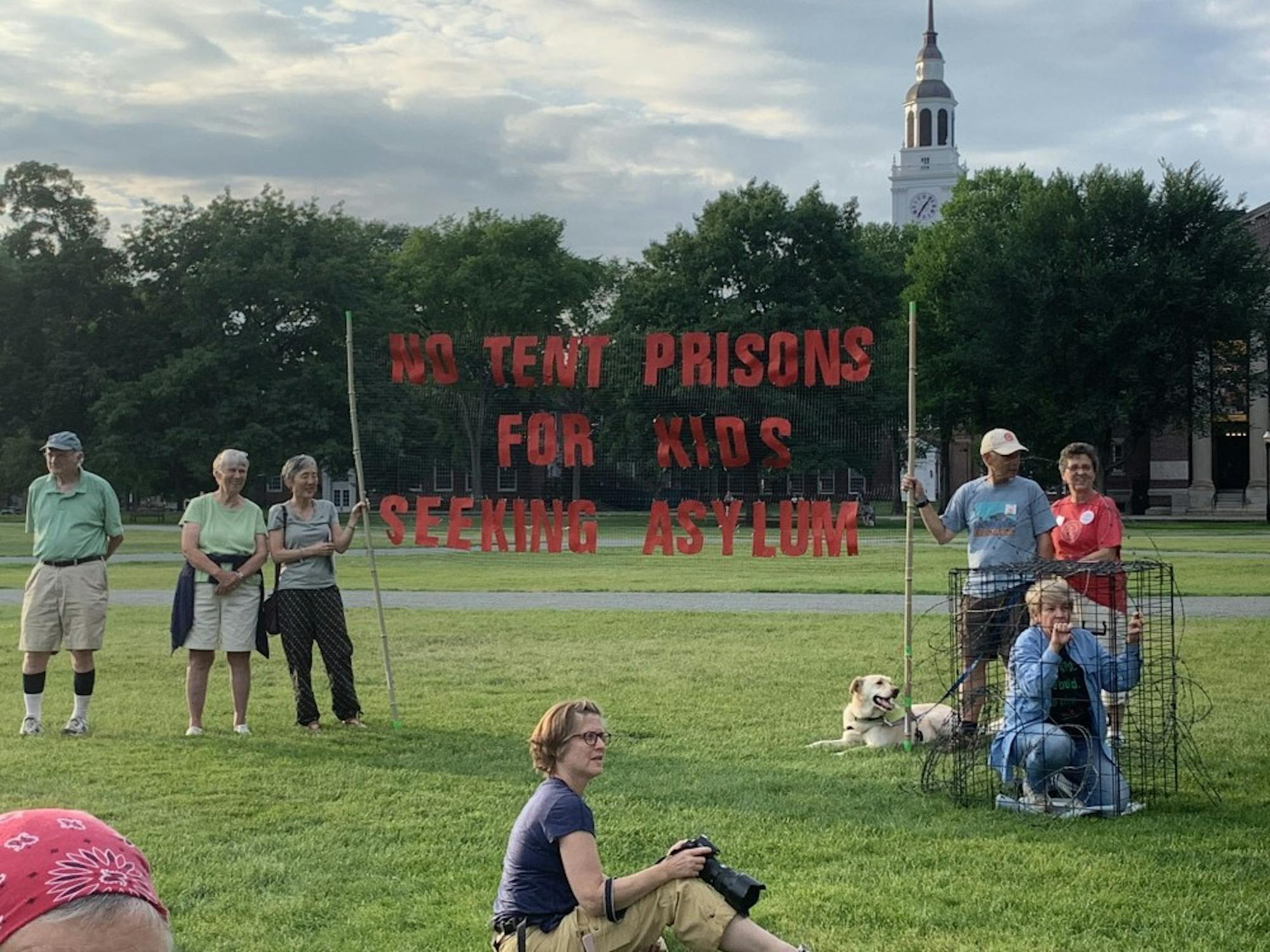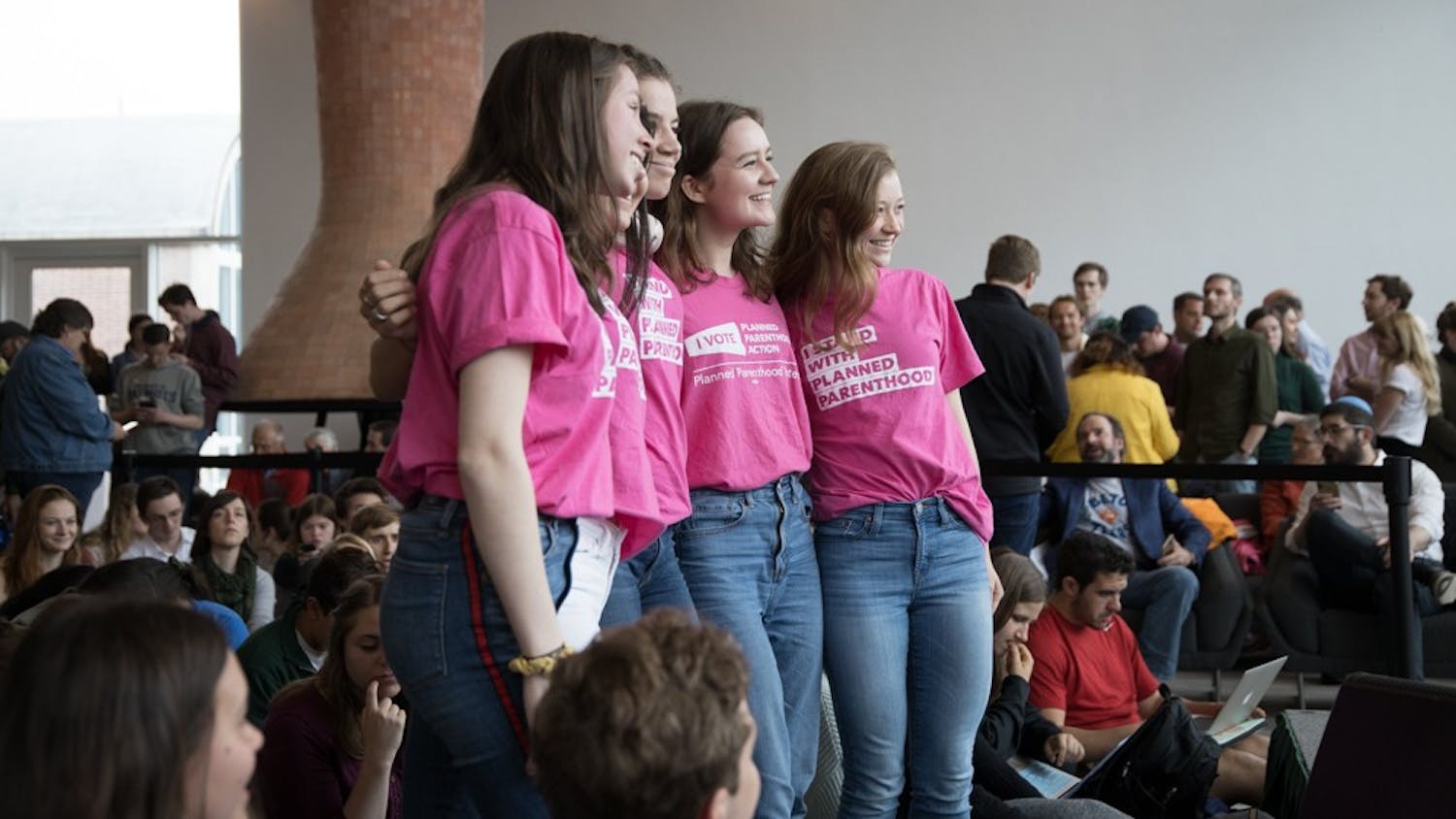There’s a saying at the College that it’s easy to get caught up in the “Dartmouth bubble.” Since Hanover, NH — pop. 11,485 — provides limited forms of entertainment for college students, the attention of the school community turns inward. Not much can lever our attention away from the center. This summer, however, the sacred Dartmouth bubble was popped.
Between July 29 and Aug. 1, 18 people were arrested by U.S. Customs and Border Patrol agents in Hartford, VT. These raids were part of a nationwide federal crackdown on immigrants without documentation. But some observers thought they came at a suspicious moment, just when the Hartford Selectboard was set to discuss passing a local ordinance that addresses how much information local police are required to share with federal immigration officers regarding the documentation status of local citizens. English and women, gender and sexuality studies professor Alexis Jetter, a veteran activist who has been involved in protesting ICE activity near campus, said she believes that authorities used these raids to discourage protest.
“This is exactly what ICE loves to do. Come into communities where there is resistance to ICE and show us that we are helpless in the face of their power, might and cruelty. They are showing that no one can escape,” she said.
Many activist groups were quick to respond. Rise! Upper Valley, a grassroots organization focused on immigration policy, staged a rally in Hartford on Aug. 14 to protest the ICE arrests, according to Valley News. The protest kicked off in Lyman Point Park with speeches, and eventually evolved into a march along Route 14, with the group coming to a stop at the Route 5 intersection. The rally spread across the road and blocked traffic for several hours. The protest eventually ended with a total of 26 arrests — including those of several Dartmouth faculty and students. History professor Pamela Voekel was among those arrested. While she had not attended the rally with the intention of being arrested, in the moment, she decided that it was the right thing to do. Voekel explained that many of the other protestors who were arrested shared a similar view.
“There was a real feeling that with the privilege we have, either as professors or older, wealthier people, it made sense for us to put ourselves in the fight,” Voekel said.
As a professor who teaches Mexican history, many of Voekel’s students are part of the affected communities or are undocumented themselves. Moreover, her knowledge of Mexican history gives her a deeper empathy for the challenges Mexican migrants experience.
History professor Annelise Orleck, another participant in the Rise! Upper Valley protest, believes that professors can play key roles in guiding political activism. Orleck said she thinks that professors can help advise and inform students who may have less experience with political activism. She also said that professors — especially history professors — are well-positioned to help their students understand the wider background of the movements so that their activism is more intentional and knowledge-based.
“Knowing history is really important. And I think that faculty can help place their students activism in a larger historical context,” she said.
Both Voekel and Orleck believe that regardless of their own personal political views, they have a responsibility to create a classroom environment in which their students feel open to express their own opinions. They say that they welcome respectful discourse and dissent and encourage their students to base their beliefs — whatever they may be — in knowledge and understanding.
“My sense of responsibility as a teacher is to create a thoughtful, respectful, open environment for discussion in my classroom and to encourage students to ground their arguments in evidence and speak to each other respectfully,” Orleck said. “I know that I have to make sure that students of all kinds, and holding of all views, feel safe to express themselves in my classroom.”
Voekel said her own political views are not the focus. While she makes no attempt to hide them, she argues that students learn more when their assumptions and biases are challenged rather than when being lectured or told what to think.
But the real world continues to intrude. Following the August raids and the RISE! Upper Valley protest, ICE set up a checkpoint along I-89, just outside of Lebanon, the day before Pre-Orientation for Dartmouth’s international students. Dartmouth was quick to produce a statement criticizing ICE’s actions and emphasizing the school’s mission to maintain a school environment that is “open” and “welcoming.”
Some, however, believe that the College’s comments did not go far enough. Jetter said that the statement was weak, and that Dartmouth needs to take a stronger public stance to protect its undocumented students. However, she acknowledged that behind closed doors, Dartmouth has taken measures to protect its at-risk students. She said that the contrast between the College’s public and private actions reflects a clear strategy to support its students without calling the ire of its conservative alumi and donors.
“Remember, when the president of Dartmouth speaks, the alums are the audience. And many of them are conservative. In fact, let’s be specific here, many of the people who have historically given the most money have been conservative. Republican hedge fund managers are the ones who have the most money to give, and they have historically been overrepresented in the Board of Trustees,” Jetter said.
Voekel also said that Dartmouth does not consistently support students with immigration issues. Students frequently complain to her about how difficult it is for them to speak with a faculty member who has the resources and knowledge to help them. And as immigration-related issues are frequently time-sensitive, maintaining an efficient and intuitive system is especially important.
Voekel said that she believes that Dartmouth’s organizational issues in the immigration office are due to a combination of factors. Similarly to Jetter, she said that systemic issues within the College can hinder its motivation and ability to streamline access to resources and aid.
“Dartmouth doesn’t have a practice of listening closely enough and privileging the voices of people from the affected communities,” she said. “And that’s in part because we are also the whitest faculty in the Ivy League. And that matters. Not because there aren’t plenty of liberals, or that any given faculty member is a racist, but overall, it creates a kind of blind spot. We tend not to respond with the same kind of alacrity we should be responding with … And so it’s a two-pronged problem. We have many conservative alums and an overwhelmingly white faculty.”
There has been a mixed response to the recent events by students across campus. Riley Gordon ’22, president of the Dartmouth Democrats, wrote in an email that he condemned recent federal actions and believes that members of the Dartmouth community need to support each other during this time.
“The scare tactics of ICE and CBP are not welcome here. It’s important not only for local leaders to take steps to welcome and protect immigrants but for students, regardless of immigration or citizenship status, to know their rights and to stick up for one another,” he wrote.
Conversely, the Dartmouth Republicans pledged their support for the efforts of U.S. Immigration and Customs Enforcement and disagreed with the way in which the College approached their response to the checkpoint. In an official post on its Facebook page, the organization stated that while it agrees with Dartmouth’s stance that issues regarding immigration and security are important, they strongly criticized the College’s declaration of “open and welcoming values.” The club said that Dartmouth’s statement disregarded “the rule of law” and “irresponsibly and shamelessly” denounced the morality of the federal law enforcement.
Regardless of which side of the political spectrum on which one falls, immigration is an issue that will continue to create friction within the nation until Congress is able to craft a coherent immigration policy. Judging by the recent activity on campus and in the larger Upper Valley, many are unhappy with the direction that the current American administration is taking. Headlines about detention camps, arrest raids and family separation have been prominent in the news and on social media, dividing the populace. Immigration issues have also taken a front row seat in the recent Democratic presidential debates, with each candidate offering his or her opinion on how to solve the crisis.
However, there is some hope. This issue has brought together students, faculty and lifetime activists who are passionate about finding a solution.
“I am excited by the political and moral mobilization of the youngest activists,” Orleck said. “And I do think that your generation will lead the way because you have to. And because I am a historian and an activist, I believe that you always need to know whose shoulders you stand on and learn from the experiences of those who came before. I am very heartened by this growing cooperation across the generations of activists.”



